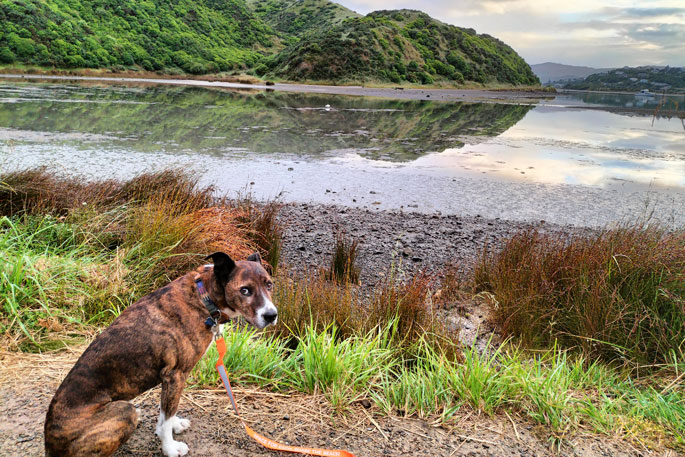As an island country with more than 15,000km of coastline, the ocean plays a special role in the lives of all New Zealanders.
It provides recreation, employment and food, and supports a wide diversity of plants and animals.
That's why we celebrate Seaweek from March 4-12, with a range of ocean-centric activities across the full week.
For many pet parents, a visit to the beach with a dog gambolling in the waves is a highlight and special activity.
With the Department of Conservation's Lead the Way initiative supported by PD Insurance, pet parents can make the most of every interaction with the sea while looking out for the other people and animals encountered on the coast.
Lead the Way helps dog owners be more aware of New Zealand's sensitive coastlines and become ‘Wildlife Wise', so pets don't damage beachside fauna and flora.
After reading DOC's Dogs on Beaches guidelines online and completing the wildlife wise quiz, dog parents can buy a colour coded ‘Lead the Way' dog lead.
NZ dog temperaments revealed by lead choice
The four coloured dog leads indicate your dogs' temperament, so passers-by know what to expect from the pooch – Green for friendly, Orange for occasionally toey, Yellow for vulnerable in some way, and Red for keep your distance.
Michelle Le Long, COO of pet insurance specialist PD Insurance, says, 'It's heartening that on quiz completion, the majority of leads ordered through the programme are green, confirming that our canine population is largely as amiable as the human one.”
Next up was orange, though a long way behind green – could this be the ‘grumpy old man' cohort of dogs? For third and fourth position it was a close-run race between red and yellow.
'Overall, though, the response has shown many people are taking responsibility by giving others an easily understood visual cue for their dogs who are either not social or at risk. We hope the programme teaches passers-by that they shouldn't approach dogs on a yellow, orange or red lead – with the best advice, as always, being to ask before petting someone else's pup.”
She also says an analysis of answers submitted on the DOC ‘Lead the Way' quiz provides valuable insights into New Zealand's dog owners and their relationship with the coastline.
When dogs and wildlife meet
The abundant life encountered on the coast means a visit with your dog could easily result in a wildlife interaction.
Le Long says the quiz showed 20 per cent of the 1000+ respondents don't know the minimum safe distance to keep between canines and wildlife.
'You should always maintain a minimum of 20 metres,” she notes, adding that ‘more is more' to avoid any harmful interaction.
While most respondents know to keep dogs off sand dunes as many birds build nests in this environment, what is less clear is that dogs should also be kept away from birds on the wet sand.
Many migratory birds forage where the waves wash the sand; if disturbed by chasing dogs, they can't get the required nourishment to regain strength after a long flight.
Most pup parents are on board with that, as 99% answered correctly, ‘it's not ok for my dogs to chase birds'.
While they appear more common than other birds, gulls are wildlife too and need their time to rest. The ‘noisy and pesky' ones are the red billed gulls, which aren't the only species of gull; black backed gulls tend to mind their own business.
Some are even threatened - the red-billed gull is in a declining status, while the black-billed gull is nationally critical and facing an immediate risk of extinction.
'They too need protection and to be spared from the distress of a dog chase,” says Le Long.
Just as pleasing, she adds, are the 98% of quiz participants who know a lead is compulsory to take along on walks as a legal requirement.
When good dogs are not so good
While some dogs (like those on a red lead) are known to be less social, even the best of ‘good boys' can have an off day or become triggered by a passing incident.
Should the worst happen and someone or another dog is attacked, it emerged that some respondents don't know who's responsible. It isn't as simple as the at-fault party being the owner of the dog that attacked.
Instead, if your dog was in your control on a lead, and someone or another dog gets in your dog's space, then it's not your fault, especially if they were warned.
'This goes straight to the importance of using a lead, but particularly an orange or red lead for dogs known to be a bit antisocial,” Le Long says.
For example, if your dog is under your control on a lead yet lashed out at an off-lead dog that rushed in, what matters is which dog was under control.
'The more people who understand this the better. Use a lead and don't allow your dog to rush up on other dogs or people!”
On the topic of things that are not so good for animal health and safety, the beach is also home to doggie-dangers.
Le Long says pet parents should be aware to keep their dogs away from toxic algae, sea slugs, puffer fish, bluebottles and jellyfish, and any rotting carcasses.
Finally, she says it's easy to be a responsible dog owner simply by being considerate and sharing the beach.
'There's plenty of room, and the rules are there for a reason. Make the most of Seaweek with your pups. It's one of the great joys of being a Kiwi.”



0 comments
Leave a Comment
You must be logged in to make a comment.